
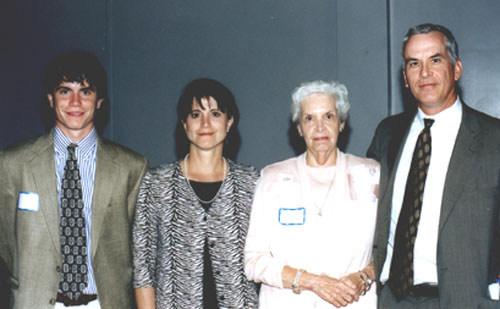
The Auburn Plainsman
Annual Banquet
Foy Student Union Building
Wednesday, May 2, 2001
Featured speaker:
Dennis Bailey,
Partner with Rushton, Stakeley, Johnson & Garrett
law firm, Montgomery
1975 Auburn journalism graduate and former reporter,
cartoonist and columnist with The Auburn Plainsman

(L-R): Managing Editor Kristin Lenz, Editorial Page Editor Ryan
Lee, Assistant Campus Editor Brandon Evans,
and Editor Rachel Davis.
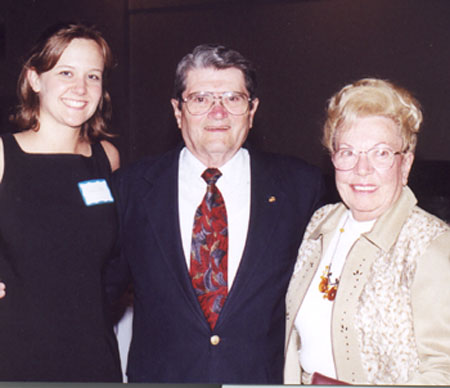
Editor Rachel Davis, retired department head and professor emeritus
Jack Simms and wife
Jo Simms.

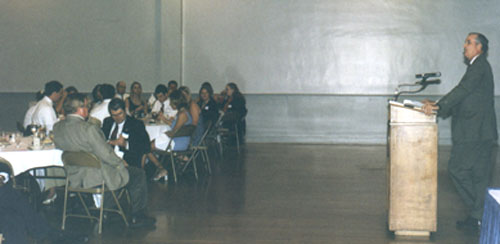
Guest speaker Dennis Bailey discusses open meetings
Speech to
The Auburn Plainsman Banquet May 2, 2001
By Dennis Bailey
First, I must say I am humbled and honored to have been asked to address
the editors
and staff of The Auburn Plainsman this evening. My time with The
Plainsman was
spent as a lowly reporter, columnist and cartoonist.
Although I wrote some fairly provocative opinion pieces which rankled the
administration
of Dr. Philpott, nothing I wrote approaches what you have
done over the
past three years. Most of my contributions were attempts to
be humorous.
The really hard decisions about whether to champion unpopular
causes during
those tumultuous mid-70s were made by courageous editors like
Bill Wood and
Rheta Grimsley (who I know spoke to you last year). I have
recently seen
editors of equal courage.
I
am proud to have assisted Lee Davidson, Bill Barrow and Rachel Davis over
the past few years.
When I worked
here I was really thought of primarily as a baseball player
who dabbled
in journalism and could draw cute cartoons--although not as good
as Jimmy Johnson,
the syndicated cartoonist whom I replaced. So based upon
what I actually
accomplished while at Auburn and on this staff I probably
have no right
to give any of you any advice or observations about anything
to do with journalism.
Heck, all I did after graduation was edit a state
arts magazine
for one year before going to law school.
I do, however,
believe I know something about the fundamental legal
principles that
affect journalists. I have dedicated a part of my law
practice to
advancing the cause of open government and the protection of
journalists
from frivolous claims. I have found it to be one of the most
rewarding parts
of practicing law. It is the only part of my practice that I
can honestly
say I have and would do for free--did I really say that? I must
have lost my
mind!
Seriously, tonight I would like to talk to you about a subject dear to
my
professional
heart: the subject of open government and the crucial part you
play in that.
Specifically I would like to offer some advice concerning a
common dilemma
and how we can do a better job dealing with it. The dilemma
we face is that
sometimes our jobs require us to take action that may
embarrass people
or institutions we know and care about. This sometimes
results in our
being criticized by people whom we respect. Sometimes, this
criticism can
cause us to question our principles.
I know this because it has happened to me. Shortly after my term as a law
clerk for a
federal judge ended, I was hired by The Montgomery Advertiser to
challenge my
judge's decision to hold in camera hearings concerning the
settlement of
the Alabama prison suit. Now this judge had given me a job as
a federal law
clerk and had treated me very well. Yet I filed a motion to
require him
to hold open hearings which eventually caused him to be reversed
by the 11th
Circuit on appeal. The case, Newman v. Graddick, is often quoted
in media law
texts on the issue of access to courtrooms and court records.
A few years after the case was over I attended a clerk's party celebrating
the judge's
60th birthday. I was sort of apprehensive because I did not know
how he felt
about the case. Other former clerks had remarked that they could
not understand
how I could sue a person who I respected and suggested I not
attend. During
the party Judge Varner caught my eye and asked me to have a
word with him.
He told me: "You know Dennis, I thought you, of all people,
would understand
that they would never settle that prison case if I required
them to meet
with me in public. When the press is in the courtroom they just
posture for
the media and never make concessions. I thought you knew that."
Well, I was speechless for a moment. I had expected something like: "Don't
worry about
that suit. I understand you were doing your job" or "Lawyers
have to take
unpopular positions" or "Glad I was able to help along your
media law career."
Instead I faced an unrepentant federal judge who honestly
believed it
was in the public's interest for him to conduct secret hearings
about how to
settle a case involving overcrowding in Alabama's prison system
and who was
obviously disappointed in me for failing to understand.
I do not remember
what I actually said in response. I would like to think I
said something
smart and important but I know I probably actually said
something lame
like "I am sorry you feel that way" or "I was just doing my
job, judge."
I do remember that the prison case was not settled for some
time thereafter
and that I sometimes felt responsible for the delay. I
actually began
to question to concept of open government in light of the
practical realities
of Alabama politics.
It took some time for me to realize that the true blame rested with the
politicians
involved and their inability to make tough decisions. The hard
truth was that
many elected and appointed officials are simply afraid to
discuss tough
issues in public. Not so much to hide improper conduct, but
rather to avoid
looking incompetent by saying something incredibly stupid.
My early doubts
in a policy of open government were resolved over the years
since. Since
that early case in my career I have seen numerous examples of
secret deals
and meetings which resulted in public outrage. A suit against
our education
system was settled in secret in a deal that so bothered the
public that
all the members of the state school board were defeated in the
next election.
A secret decision to remove a city manager in a Birmingham
suburb caused
every member of the city council to be removed from office and
replaced with
persons who had never held political office. In other words, I
have seen evidence
that despite their fears of looking dumb it really is in
the best interests
of politicians to subject their ideas to the court of
public opinion
before they make decisions. After all, being honestly
incompetent
in open meetings will not get a politician defeated as fast as
making a bad
decision in secret.
But I know that some competent politicians still feel today as the federal
judge did in
1982: The public is best served by the kind of give and take
that can occur
during secret meetings about controversial subjects. When
"off the record"
these politicians might even admit that they do not trust
the media or
the public to be able to understand the complexities of the
problems they
face. Therefore, although a lot of things will change in
journalism in
the next 10 years, one thing you can count on is the ingenuity
of politicians
in inventing ways to avoid conducting real business in
public. And
without aggressive journalists they will succeed until it blows
up in their
faces as it eventually will.
Tonight I stand before you as the lawyer representing a newspaper against
my own city
of Montgomery and my own alma mater seeking simply to require
their meetings
to be held in public so that the workings of these
organizations
will be transparent to those they affect. I personally like
and respect
many of the people involved. David Housel was the advisor to The
Plainsman when
I was here and did an excellent job. Jack Venable is the
former head
of the Alabama Press Association and a friend. I, like many of
you, am confronted
with questions like: "If you love Auburn how can you
embarrass or
criticize those that govern them?" Or "Aren't you just giving
aid and comfort
to the enemy in Tuscaloosa by airing our dirty laundry in
public?" How
are we to respond to such questions?
With regard to Auburn I would simply say this: "The current turmoil at
Auburn would
not have occurred if the entire decision making process had
been open to
the public all along. By meeting in secret The Board of
Trustees lost
touch with large segments of the Auburn community. In my
opinion the
current situation presents one of the best examples I have ever
seen of why
open meetings are in the best interest of everyone--even those
who govern.
Secrecy is the root cause of the loss of confidence in the Board
of Trustees
at Auburn. Therefore, those who really love Auburn should oppose
secret meetings
by the Board of Trustees."
Auburn people will never regain trust in their leadership until they are
confident that
they are privy to the true reasons for the hard decisions
that have to
be made at a University during trying economic times. Secrecy
destroys that
confidence. Openness is the path to renewed confidence in the
leadership of
Auburn. Openness will reveal the true motives and level of
competence of
those that govern. Openness will either increase confidence or
provide evidence
for resignation or impeachment.
I firmly believe that if we can play a part in ending secrecy at Auburn,
then we have
truly done something that will help Auburn for years to come. I
will handle
the legal side of the issue if you will continue to do the heavy
lifting, the
day to day investigation and reporting that lets those who
govern know
that they are being eyed by an aggressive watch dog on a long
leash.
So I want to take this opportunity to thank you for supporting the effort
to open board
meetings. I also want to commend you for the courage you have
shown over the
past several years in questioning those who, in effect, own
your newspaper.
But I also want to challenge you wherever you are next
semester to
continue to be champions of open government. You have witnessed
first hand the
failure of confidence that occurs when the leaders of a great
institution
conduct their business in secret. Never be persuaded that
secrecy is ever
good for Auburn or any governmental institution.
The
heart of our republic--and of any good government--is meaningful, active
participation
by its citizens in government decisions which touch their
lives. Never
forget that the core of such a system is the ability of
ordinary citizens
to hold officials accountable for their actions. To be
able to do that
concerned citizens must be allowed to see openly into the
activities of
their government rather than having those processes cloaked in
secrecy. Former
President James Madison--one of the authors of The
Federalist Papers--said
it best in 1822:
A
popular Government, without popular information, or the means of
acquiring it,
is but a prologue to a farce or a tragedy; or, perhaps both.
Knowledge will
forever govern ignorance; and a people who mean to be their
own governors
must arm themselves with the power which knowledge gives."
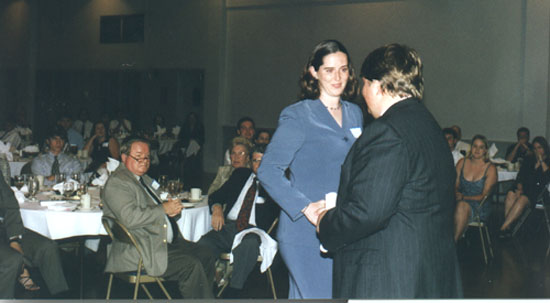
Outgoing business manager James Long and 2001-02 business manager Katie Patrick

Lee Sargent receives Account Executive of the Year Award from Business Manager James Long.
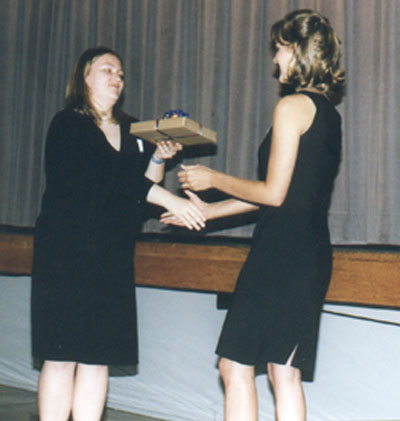
Managing Editor Kristin Lenz, left, presents gift to outgoing Editor
Rachel Davis
on behalf of 2001 staff.

Editor Rachel Davis says farewell to staff.
|
By Rachel Davis Editor, 2000-01 Plainsman Banquet Farewell Address May 2, 2001 If I had to make a list of my least favorite things to do, number one on that list would be speaking in public. Number two, saying goodbye. But, lucky me, I get to do both tonight. But donít worry, Iíll be brief and promise not to bore you with any unnecessary sob stories. Besides, I have already been warned by our esteemed advisor ó Mr. Williams ó that it is rude to go on and on with a farewell speech when everyone is already inching toward to door, which I am assured some of you already are. However, I will offer some of you thanks, let you in on a couple of my experiences in that dungeon we call a newsroom and finally bid you goodbye and farewell, for there are stories to be told of other governments, other scandals and other people awaiting me just around the corner. First, the lamentations. Any good public speaker knows you begin with the sad news and end on a high note. This keeps the audience interested. I hope youíre still with me. Itís hard for me to put into words something you would only understand through experience. But I will try. The Auburn Plainsman has been described as a mirror and microscope, a lone beacon in the night, a true bright spot in a murky pond. It has also been described as a troublemaker, work of fiction and Auburnís literary magazine for a group of malcontents. But, who reads those Plainsman message boards anyway. The Auburn Plainsman, no matter how you refer to it, has and will always be one of Auburnís greatest assets. It has set the tone through the years for University policies and politics, tradition and transition. For 107 years we have recorded and commented on the events of history though the pages of The Plainsman. Just as those pages begin to yellow and tear new pages are added by the staffers of our institution. And what an incredible group of people that contribute to this legacy. Yes, they are different. But I like them, they are like me. Pursuance of truth and honesty, always realists but forever idealists. They're a rare breed. Kristin Lenz described the people that burn that midnight oil every Monday and Tuesday night as a "rare breed of a rare breed." Not only are we journalists ó which that in itself is far from any normal profession ó but we are also journalists who somehow found their way to The Auburn Plainsman ó that, by definition, sums up our differences. I will be forever indebted to this rare breed before you tonight for the many lessons they have taught me thoughout out my tenure here. So begin the thanks:
Alex you are a great assets to this paper and will be sorely missed when you take that diploma in hand next Saturday. I believe itís typical in newsrooms for the sports editors and reporters to become somewhat ostracized by the rest of the staff ó whether that is of their own accord or others. But, you have helped unify the staff on more than one occasion. Through the high turnover this year, you have helped guide the newcomers to the ways of The Plainsman and provide an excellent example of what it means to live, breath and sleep The Auburn Plainsman. Thank you. Thank you for pulling two all-nighters in a row on several occasions just to get that great story on page 1. Thank you for placing a calming hand on the upset emotions of fellow staff members. Thank you for keeping me straight. Kristin. Forever the motivator. She provided a swift kick to the backside when we needed it ó which was most every Tuesday and Wednesday deadline. She helped cultivate the AP style and design talents of those of us who never paid attention in our academic classes. She offered a shoulder to those of us who had reached the bottom and could go no further. When it seemed that one more paper just wasn't possible she would rally the troops with threats of condemnation and everything seemed to fall back into its perfect place. Thank you for being that force that drove this paper to successful deadline days, and proud Thursdays. My sincere thanks for your eventual understanding and support. Ryan, yep itís time. I wish I could pack you up in a box and ship you to Jacksonville next week. But better things and one more year fighting Auburnís fights have called you elsewhere. I wrote in my farewell column that I learned more from people at Auburn than any class I ever took. You are one of those people, but you know that. What you donít know is how high I hold my head when we tear down the Concourse or through Foy Union contemplating next weekís newspaper ó or when weíre just going to get a coke. You have been my motivator this year, my support, my confidant. We have been accused of sharing a brain óone needing the other to function properly. I donít necessarily subscribe to this theory, but I do agree that I am a better journalist, a better person having benefited from your brain, your heart. Thank you. Ms. Kim, Ms. Keeley, Ms. Donna, Ms. Jan. You are the constant in the lives of so many transients. You sometimes go under appreciated, but you are part of the reason The Plainsman enjoys so much success. Far be it from journalism students to try their hand at the business operations of a newspaper. Thank you for your unending love, support and understanding of my sometimes frazzled lifestyle. Mr. Williams, donít worry Iím about to wrap it up. You know that little black chair in your office? I think Iím going to miss that chair more than the one in the office next to yours. You are something else. You have the ability to tear someone up one side and down down the other ó justifiably telling it like it is ó and in the same sentence build their self-confidence and self-esteem by telling them that you liked their work. You see, we strive to please you. There is a certain level of satisfaction to seeing "good story," "excellent editorials," or nice column on our work. We have achieved and you have helped us there. Thank you to the entire staff for a job well done this year. Congratulations on living up to the standards that Auburn people hold us to. You have given her 29 great editions of The Auburn. You have helped her to her feet, you have helped her forge the battle, you have helped her win the war that will be remembered long after we have been forgotten. Dan Doughtie, photo editor in 1974 and whose name is honored with the photo award that is give every year, said in his farewell column, "But when you finally leave, it dawns on you that you are being replaced and your name becomes a byline or a photo credit turning yellow with age on a crumpled Plainsman." Thank you for a wonderful year. See you at the reunion.
|
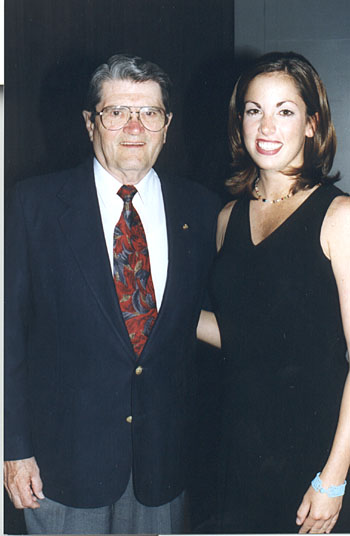
Professor Emeritus Jack Simms congratulates journalism senior Dawn Russell,
recipient of the Porter and Alice Harvey Scholarship.

Journalism sophomore Adam Jones, summer 2001 managing editor of The
Auburn Plainsman is 2001-02 recipient
of the Boone Newspapers, Inc. Scholarship. From left are Mike
Alfers, publisher of The (Alexander City) Outlook;
Kerry Whipple, Outlook managing editor; Jones; and Jim Morgan, publisher
of The Andalusia Star-News. The Outlook
and The Star-News are BNI-member newspapers.
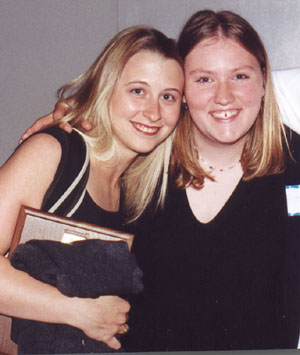
Julie Morris, left, recipient of Dan Doughtie Photographer of
the Year Award, and Kristin Lenz, recipient of William Winton
Watkins Memorial Award.
2000-01 scholarships and awards
Boone Newspapers, Inc. Scholarship
Adam Jones
Porter and Alice Harvey Scholarship
Dawn Russell
The Barrett C. Shelton Scholarships
Sponsored by the Shelton family and The Decatur Daily
Amanda Messer
Ryan Lee
The Lynne Hopkins Memorial Scholarship
Lauren Glenn
Louise & Henry P. Johnson Scholarship
Sally Tidwell
Gene Vandiver Memorial Scholarship
Brandon Evans
Mary Whitley Memorial Scholarship
Faith Ford
William Winton Watkins III Memorial Award
Kristin Lenz
Daniel H. Doughtie Photographer of the Year Award
Julie Morris
Account Executive of the Year Award
Lee Sargent
Production Artist of the Year Award
Joanna Artell
Mickey Logue Award for Dependability, Service and Excellence
Ryan Lee